Runpeng Dai
Parallel-Probe: Towards Efficient Parallel Thinking via 2D Probing
Feb 03, 2026Abstract:Parallel thinking has emerged as a promising paradigm for reasoning, yet it imposes significant computational burdens. Existing efficiency methods primarily rely on local, per-trajectory signals and lack principled mechanisms to exploit global dynamics across parallel branches. We introduce 2D probing, an interface that exposes the width-depth dynamics of parallel thinking by periodically eliciting intermediate answers from all branches. Our analysis reveals three key insights: non-monotonic scaling across width-depth allocations, heterogeneous reasoning branch lengths, and early stabilization of global consensus. Guided by these insights, we introduce $\textbf{Parallel-Probe}$, a training-free controller designed to optimize online parallel thinking. Parallel-Probe employs consensus-based early stopping to regulate reasoning depth and deviation-based branch pruning to dynamically adjust width. Extensive experiments across three benchmarks and multiple models demonstrate that Parallel-Probe establishes a superior Pareto frontier for test-time scaling. Compared to standard majority voting, it reduces sequential tokens by up to $\textbf{35.8}$% and total token cost by over $\textbf{25.8}$% while maintaining competitive accuracy.
StatEval: A Comprehensive Benchmark for Large Language Models in Statistics
Oct 10, 2025Abstract:Large language models (LLMs) have demonstrated remarkable advances in mathematical and logical reasoning, yet statistics, as a distinct and integrative discipline, remains underexplored in benchmarking efforts. To address this gap, we introduce \textbf{StatEval}, the first comprehensive benchmark dedicated to statistics, spanning both breadth and depth across difficulty levels. StatEval consists of 13,817 foundational problems covering undergraduate and graduate curricula, together with 2374 research-level proof tasks extracted from leading journals. To construct the benchmark, we design a scalable multi-agent pipeline with human-in-the-loop validation that automates large-scale problem extraction, rewriting, and quality control, while ensuring academic rigor. We further propose a robust evaluation framework tailored to both computational and proof-based tasks, enabling fine-grained assessment of reasoning ability. Experimental results reveal that while closed-source models such as GPT5-mini achieve below 57\% on research-level problems, with open-source models performing significantly lower. These findings highlight the unique challenges of statistical reasoning and the limitations of current LLMs. We expect StatEval to serve as a rigorous benchmark for advancing statistical intelligence in large language models. All data and code are available on our web platform: https://stateval.github.io/.
VOGUE: Guiding Exploration with Visual Uncertainty Improves Multimodal Reasoning
Oct 01, 2025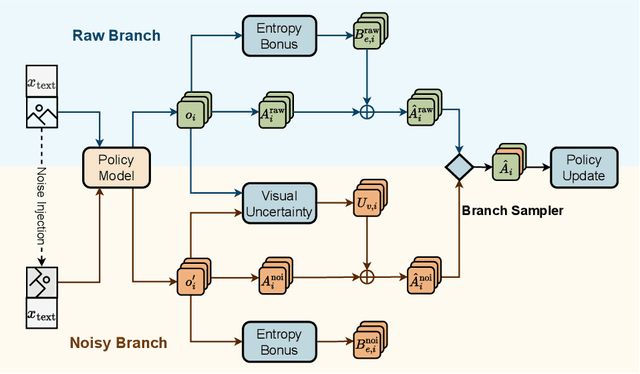
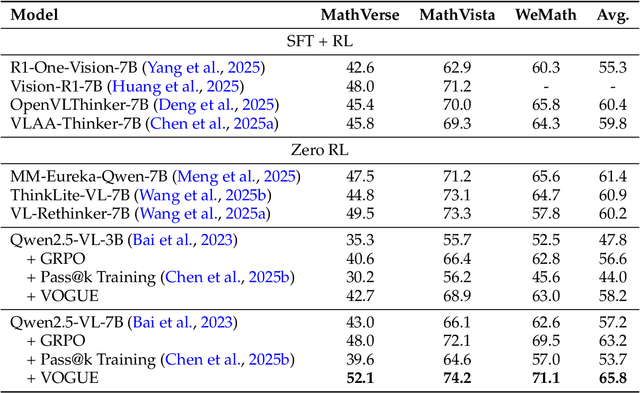
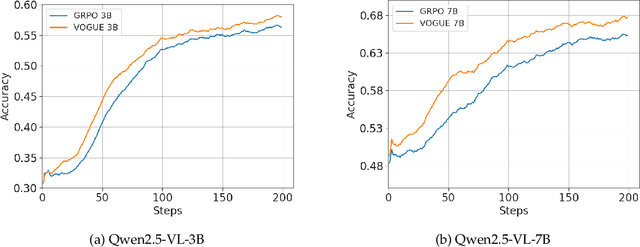
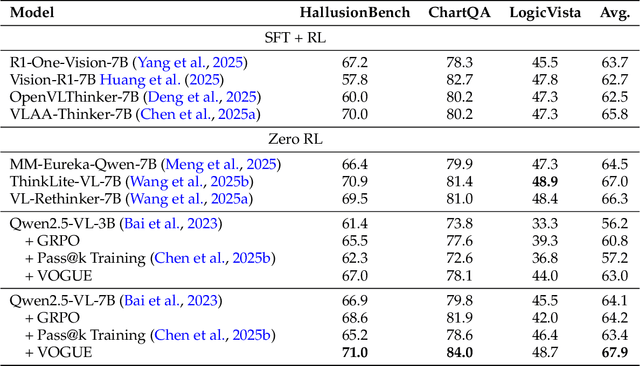
Abstract:Reinforcement learning with verifiable rewards (RLVR) improves reasoning in large language models (LLMs) but struggles with exploration, an issue that still persists for multimodal LLMs (MLLMs). Current methods treat the visual input as a fixed, deterministic condition, overlooking a critical source of ambiguity and struggling to build policies robust to plausible visual variations. We introduce $\textbf{VOGUE (Visual Uncertainty Guided Exploration)}$, a novel method that shifts exploration from the output (text) to the input (visual) space. By treating the image as a stochastic context, VOGUE quantifies the policy's sensitivity to visual perturbations using the symmetric KL divergence between a "raw" and "noisy" branch, creating a direct signal for uncertainty-aware exploration. This signal shapes the learning objective via an uncertainty-proportional bonus, which, combined with a token-entropy bonus and an annealed sampling schedule, effectively balances exploration and exploitation. Implemented within GRPO on two model scales (Qwen2.5-VL-3B/7B), VOGUE boosts pass@1 accuracy by an average of 2.6% on three visual math benchmarks and 3.7% on three general-domain reasoning benchmarks, while simultaneously increasing pass@4 performance and mitigating the exploration decay commonly observed in RL fine-tuning. Our work shows that grounding exploration in the inherent uncertainty of visual inputs is an effective strategy for improving multimodal reasoning.
CDE: Curiosity-Driven Exploration for Efficient Reinforcement Learning in Large Language Models
Sep 11, 2025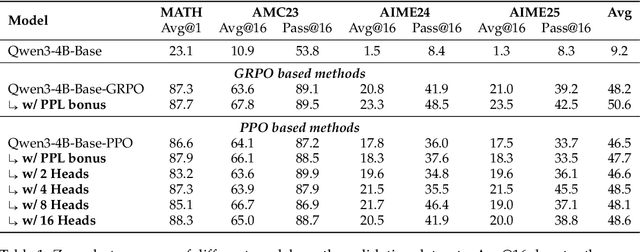

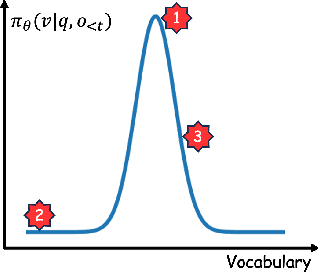

Abstract:Reinforcement Learning with Verifiable Rewards (RLVR) is a powerful paradigm for enhancing the reasoning ability of Large Language Models (LLMs). Yet current RLVR methods often explore poorly, leading to premature convergence and entropy collapse. To address this challenge, we introduce Curiosity-Driven Exploration (CDE), a framework that leverages the model's own intrinsic sense of curiosity to guide exploration. We formalize curiosity with signals from both the actor and the critic: for the actor, we use perplexity over its generated response, and for the critic, we use the variance of value estimates from a multi-head architecture. Both signals serve as an exploration bonus within the RLVR framework to guide the model. Our theoretical analysis shows that the actor-wise bonus inherently penalizes overconfident errors and promotes diversity among correct responses; moreover, we connect the critic-wise bonus to the well-established count-based exploration bonus in RL. Empirically, our method achieves an approximate +3 point improvement over standard RLVR using GRPO/PPO on AIME benchmarks. Further analysis identifies a calibration collapse mechanism within RLVR, shedding light on common LLM failure modes.
Parallel-R1: Towards Parallel Thinking via Reinforcement Learning
Sep 09, 2025Abstract:Parallel thinking has emerged as a novel approach for enhancing the reasoning capabilities of large language models (LLMs) by exploring multiple reasoning paths concurrently. However, activating such capabilities through training remains challenging, as existing methods predominantly rely on supervised fine-tuning (SFT) over synthetic data, which encourages teacher-forced imitation rather than exploration and generalization. Different from them, we propose \textbf{Parallel-R1}, the first reinforcement learning (RL) framework that enables parallel thinking behaviors for complex real-world reasoning tasks. Our framework employs a progressive curriculum that explicitly addresses the cold-start problem in training parallel thinking with RL. We first use SFT on prompt-generated trajectories from easier tasks to instill the parallel thinking ability, then transition to RL to explore and generalize this skill on harder problems. Experiments on various math benchmarks, including MATH, AMC23, and AIME, show that Parallel-R1 successfully instills parallel thinking, leading to 8.4% accuracy improvements over the sequential thinking model trained directly on challenging tasks with RL. Further analysis reveals a clear shift in the model's thinking behavior: at an early stage, it uses parallel thinking as an exploration strategy, while in a later stage, it uses the same capability for multi-perspective verification. Most significantly, we validate parallel thinking as a \textbf{mid-training exploration scaffold}, where this temporary exploratory phase unlocks a higher performance ceiling after RL, yielding a 42.9% improvement over the baseline on AIME25. Our model, data, and code will be open-source at https://github.com/zhengkid/Parallel-R1.
Deep Distributional Learning with Non-crossing Quantile Network
Apr 11, 2025Abstract:In this paper, we introduce a non-crossing quantile (NQ) network for conditional distribution learning. By leveraging non-negative activation functions, the NQ network ensures that the learned distributions remain monotonic, effectively addressing the issue of quantile crossing. Furthermore, the NQ network-based deep distributional learning framework is highly adaptable, applicable to a wide range of applications, from classical non-parametric quantile regression to more advanced tasks such as causal effect estimation and distributional reinforcement learning (RL). We also develop a comprehensive theoretical foundation for the deep NQ estimator and its application to distributional RL, providing an in-depth analysis that demonstrates its effectiveness across these domains. Our experimental results further highlight the robustness and versatility of the NQ network.
Spatio-temporal Prediction of Fine-Grained Origin-Destination Matrices with Applications in Ridesharing
Mar 31, 2025Abstract:Accurate spatial-temporal prediction of network-based travelers' requests is crucial for the effective policy design of ridesharing platforms. Having knowledge of the total demand between various locations in the upcoming time slots enables platforms to proactively prepare adequate supplies, thereby increasing the likelihood of fulfilling travelers' requests and redistributing idle drivers to areas with high potential demand to optimize the global supply-demand equilibrium. This paper delves into the prediction of Origin-Destination (OD) demands at a fine-grained spatial level, especially when confronted with an expansive set of local regions. While this task holds immense practical value, it remains relatively unexplored within the research community. To fill this gap, we introduce a novel prediction model called OD-CED, which comprises an unsupervised space coarsening technique to alleviate data sparsity and an encoder-decoder architecture to capture both semantic and geographic dependencies. Through practical experimentation, OD-CED has demonstrated remarkable results. It achieved an impressive reduction of up to 45% reduction in root-mean-square error and 60% in weighted mean absolute percentage error over traditional statistical methods when dealing with OD matrices exhibiting a sparsity exceeding 90%.
Causal Deepsets for Off-policy Evaluation under Spatial or Spatio-temporal Interferences
Jul 25, 2024



Abstract:Off-policy evaluation (OPE) is widely applied in sectors such as pharmaceuticals and e-commerce to evaluate the efficacy of novel products or policies from offline datasets. This paper introduces a causal deepset framework that relaxes several key structural assumptions, primarily the mean-field assumption, prevalent in existing OPE methodologies that handle spatio-temporal interference. These traditional assumptions frequently prove inadequate in real-world settings, thereby restricting the capability of current OPE methods to effectively address complex interference effects. In response, we advocate for the implementation of the permutation invariance (PI) assumption. This innovative approach enables the data-driven, adaptive learning of the mean-field function, offering a more flexible estimation method beyond conventional averaging. Furthermore, we present novel algorithms that incorporate the PI assumption into OPE and thoroughly examine their theoretical foundations. Our numerical analyses demonstrate that this novel approach yields significantly more precise estimations than existing baseline algorithms, thereby substantially improving the practical applicability and effectiveness of OPE methodologies. A Python implementation of our proposed method is available at https://github.com/BIG-S2/Causal-Deepsets.
 Add to Chrome
Add to Chrome Add to Firefox
Add to Firefox Add to Edge
Add to Edge